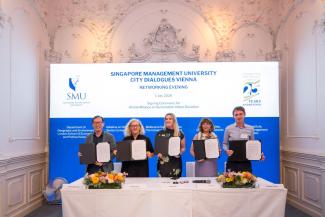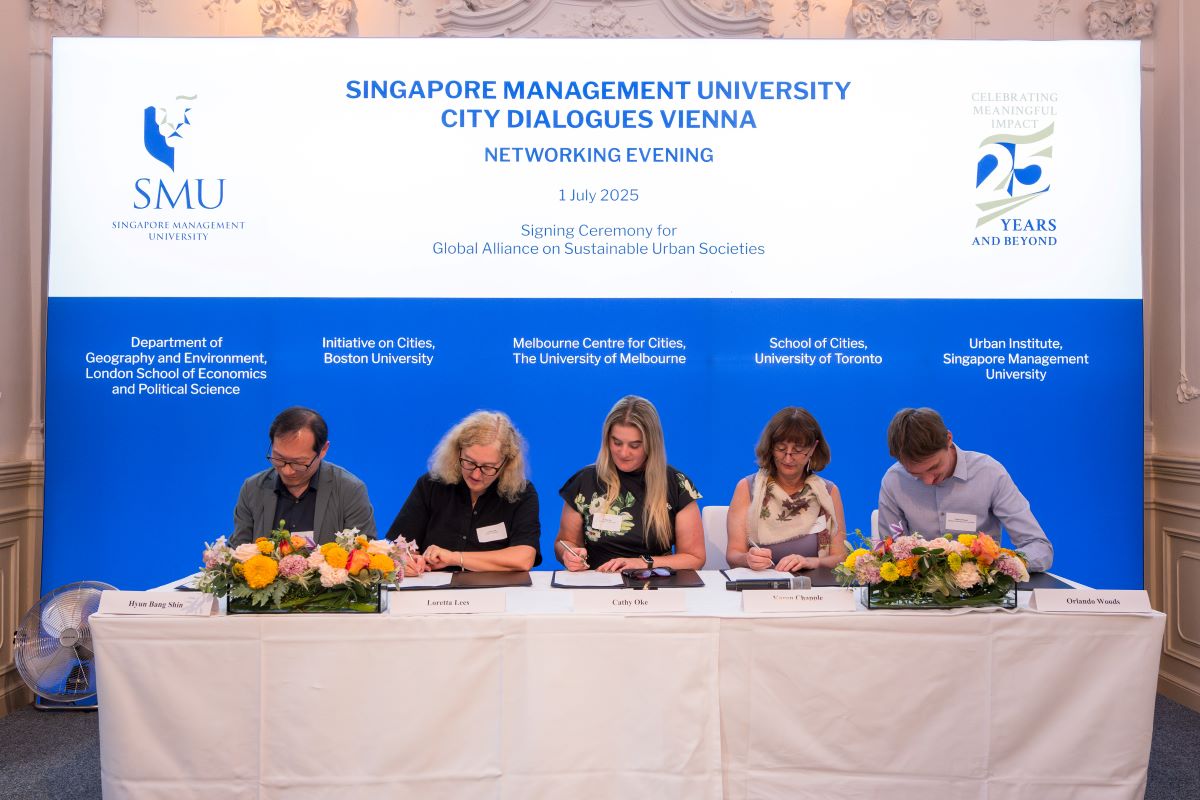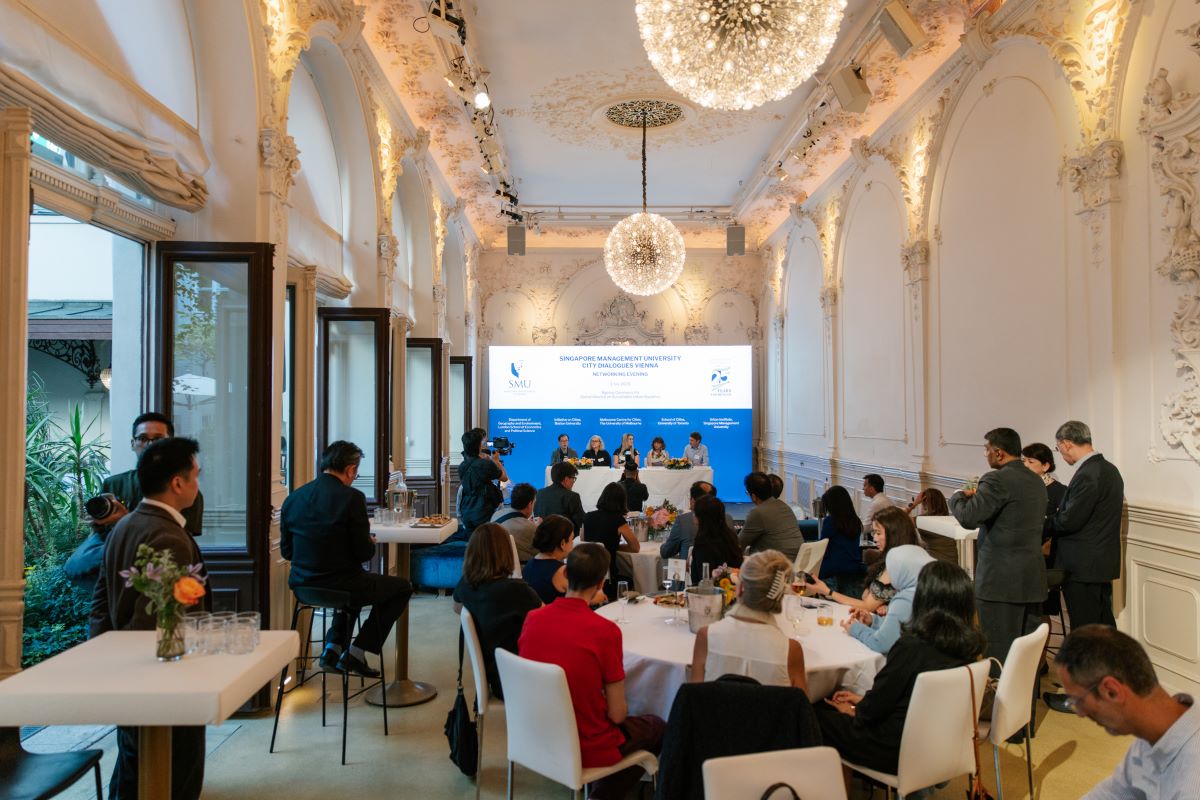
(Vienna, Austria) Wednesday, 2 July 2025 – Five globally respected academic institutions have come together to launch the Global Alliance on Sustainable Urban Societies – a pioneering initiative that places people at the heart of urban research and policymaking. The partnership was announced today at the Singapore Management University (SMU) City Dialogues held in Vienna, taking place as part of the Mayors Forum of the World Cities Summit 2025.
The founding members of the alliance are:
- The Urban Institute, Singapore Management University
- The Initiative on Cities, Boston University
- The Department of Geography and Environment, The London School of Economics and Political Science (LSE)
- Melbourne Centre for Cities, University of Melbourne
- The School of Cities, University of Toronto

Representatives from the five founding institutions signed an agreement at a networking reception of the SMU City Dialogues Vienna.
Formed around a shared vision of interdisciplinary and human-centred urban research, the Alliance aims to deepen understanding of how city dwellers sense, navigate and shape the urban environments they inhabit. This includes examination of the social and cultural norms, social networks and economic linkages – the “soft infrastructures” – that underpin resilient and sustainable cities.
In an era of accelerating digital transformation, the Alliance embraces the fusion of critical social science with data science to offer fresh, actionable insights into urban life. By recognising people as sensors, enablers and actuators, the collaboration acknowledges the vital, multi-faceted role of residents in shaping sustainable urban societies.
The Alliance will collaborate through:
- Joint research initiatives and academic publications
- Co-hosted workshops and global conferences
- Faculty and student exchanges
- Responsible data-sharing protocols that uphold privacy and confidentiality
The founding institutions extend an open invitation to like-minded academic institutions to join the Alliance in advancing a collective understanding of sustainable, people-first cities.
Speaking at the SMU City Dialogues Vienna, the founding institutions underscored their commitment to fostering a diverse, inclusive and global network of urban researchers.
Professor Orlando Woods, the Director of the Urban Institute at SMU, said, “The joint vision is to pursue interdisciplinary research that views cities through a human-centred lens to shape sustainable urban societies and promote urban resilience. This exciting collaboration will deepen knowledge in an important field across the founding institutions, and it encompasses joint research projects, academic publications and workshops and conferences. It is also empowered by student and faculty exchanges, and data sharing initiatives that safeguard the confidentiality, privacy and security of individuals’ data. We welcome like-minded academic institutions to join this alliance.”
Professor Loretta Lees, the Director of the Initiative on Cities at Boston University, said, “The Initiative on Cities at Boston University is an interdisciplinary research, learning and practice centre focused on resilient and liveable cities. To be resilient and liveable, cities must be socially sustainable, and we need to understand how individuals and communities perceive, interact with, and are affected by urbanisation and the urban environment. Ensuring equitable access to resources and opportunities in cities is important because this affects well-being and quality of life. Investigating urban community building and socio-cultural interactions and connections is strategic in terms of building human resilience to shocks, environmental, economic, or other. Working with like-minded urbanists globally is critical towards these goals, and we are very excited to be a part of launching this global urban alliance.”
Professor Hyun Bang Shin, the Head of the Department of Geography and Environment at the London School of Economics and Political Science, said, “The Department of Geography and Environment at LSE embodies international excellence through its diverse community of globally engaged academics, researchers, and students. Our work addresses some of the world’s most pressing urban challenges, combining rigorous academic inquiry with applied, policy-relevant solutions. Committed to fostering sustainable, equitable, and inclusive urban futures, we produce research that informs global debates, shapes practice, and empowers communities—from informal settlements to global cities—towards more just and resilient urban worlds. We are excited to be part of this global alliance on sustainable urban societies and look forward to working together with like-minded urban scholars across the world.”
Associate Professor Cathy Oke, Director of the Melbourne Centre for Cities, said, “At the Melbourne Centre for Cities we believe strongly in the importance of international collaboration between and amongst cities and universities, to further urban scholarship policy and decisions informed by lived experiences, shared goals, challenges and opportunities faced by urban settlements around the world. We’re delighted to be part of this global alliance, and look forward to finding new opportunities to help leaders and citizens as they shape just, thriving cities.”
Professor Karen Chapple, Director of the School of Cities, and Professor, Department of Geography & Planning, at the University of Toronto, said, “The School of Cities is delighted to be a founding member of the Global Alliance on Sustainable Urban Societies. This partnership reflects our deep commitment to advancing inclusive, interdisciplinary urban research that centres the lived experiences of residents and city-builders. By working collaboratively across continents and disciplines, we can better understand the complex social fabrics that make cities resilient, and co-create solutions that are both innovative and grounded in the realities of urban life.”

Enclosures are in the PDF:
Annex 1 – Photos of the signing ceremony
Annex 2 – About SMU City Dialogues 2025